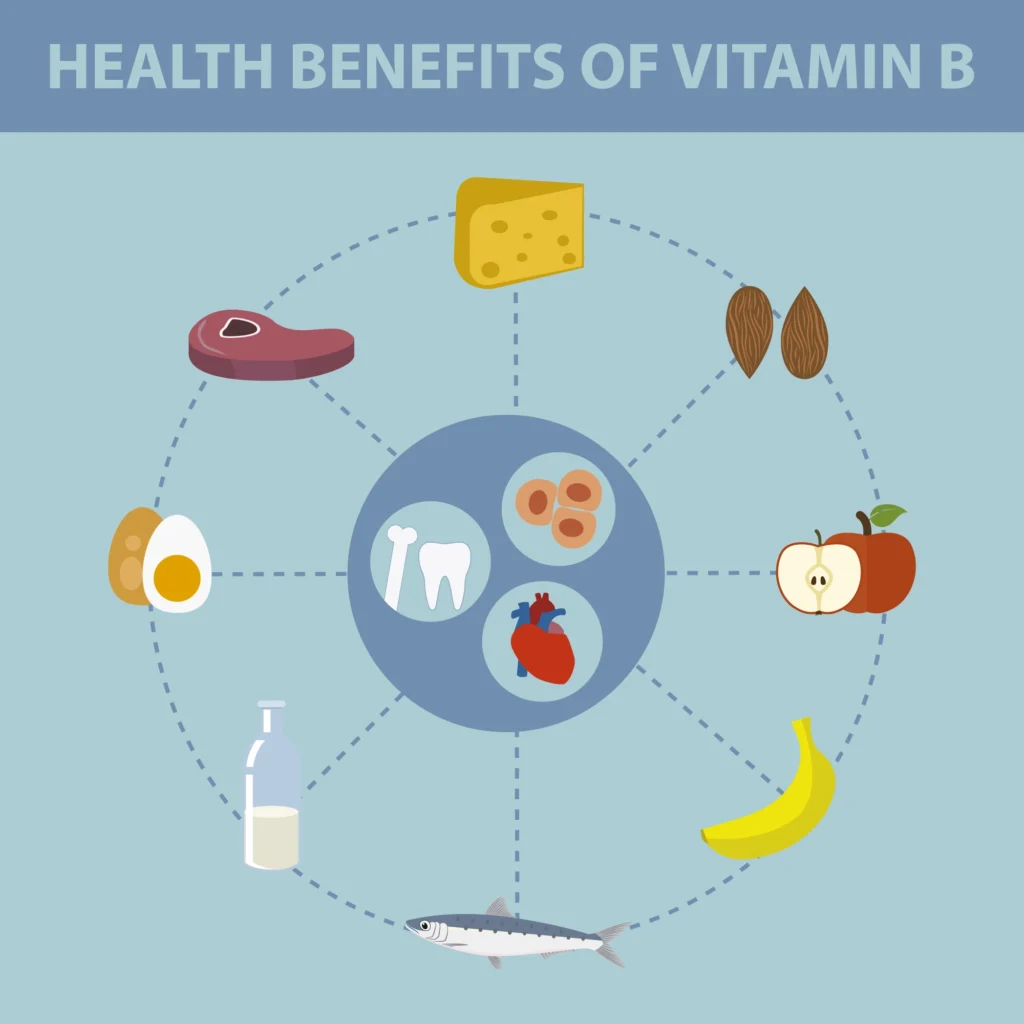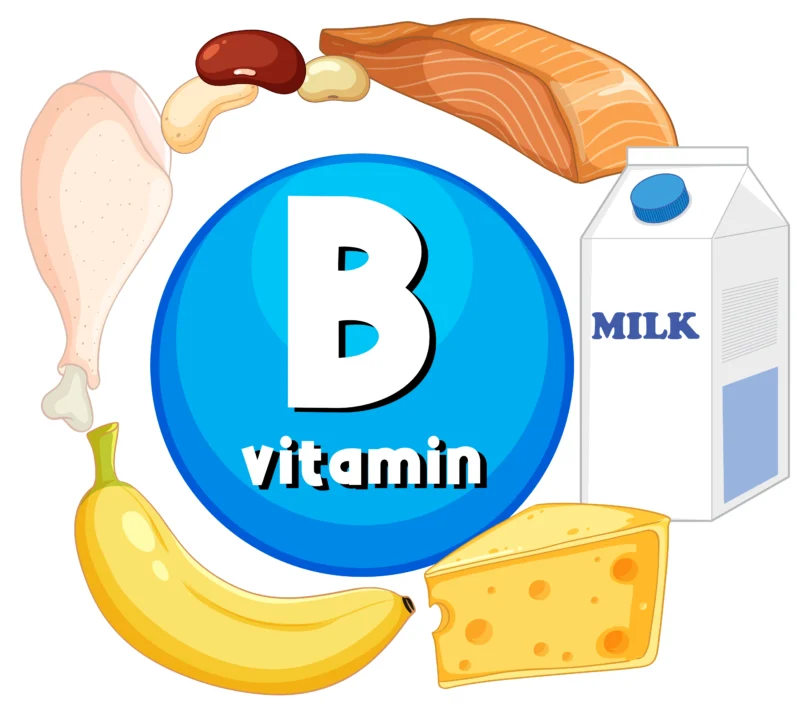Have you ever experienced the feeling where you’ve followed your diet to a tee, exercised consistently, and not seen any movement on the scale? You are tired, exhausted, and just want to give up. We’ve all been there, haven’t we? Here’s the thing that most people do not realise about B vitamins for weight loss, they are more than a marketing gimmick, and they are proven to be efficient nutrients that may be missing from your weight loss picture.
Weight Loss isn’t just about calories in and calories out. Rather, it is also about how effectively your body utilizes those calories, converts those calories into usable energy, and its efficiency in supporting your metabolism. People who try to use B vitamins for weight loss find that B vitamins help them as a silent partner in their weight loss success.
B vitamins are the true behind-the-scenes teammates of energy production and metabolism. When your body has proper levels of B vitamins, everything feels better—from your morning workouts to your afternoon energy levels. In this complete guide, we will break down the interesting science of B vitamins and how improving your intake of B vitamins could change your weight loss story.
What Are B Vitamins Good for
B vitamins are not one single nutrient, but rather, they are a team of eight essential water-soluble vitamins. All eight of these vitamin “teammates” need to work together to help you optimally maintain every process in your body. Some people like to think of B vitamins as your body’s crew team, ensuring that all of your metabolic processes are functioning as effectively as possible. These amazing nutrients are coenzymes, meaning that they help the enzymes produce thousands of chemical reactions in your body each and every day. The primary job of these nutrients together? Change all the food you eat, carbohydrates, fat, and protein, into usable energy (ATP) that runs all the systems in your body, from the beating of your heart to your most intense gym session.
B vitamins include: B1 (Thiamine), B2 (Riboflavin), B3 (Niacin), B5 (Pantothentic acid), B6 (Pyridoxine), B7 (Biotin), B9 (Folates), and B12 (Cobalamin). Each one has it’s own responsibility, but all together make up an incredible team of support for your metabolism and health!
So, when people start looking for the best B vitamin for weight loss, they tend to get frustrated if they don’t find the answer that looks like one thing. The real magic is making sure that all of the B vitamins are doing their job at the same time, and that’s when the “magic” happens to assist with the body’s natural ability to burn fat and have energy.
B Vitamins And Weight Loss Connection

This is where the science behind B complex benefits in weight loss is pretty cool. These nutrients work together through a number of different pathways that affect your ability to lose weight and keep it off through some powerful mechanisms.
Increasing Your Metabolic Rate
Think of your metabolism like an internal furnace, it is continuously burning calories to allow you to stay alive and active. If you use B vitamins for weight loss are absolutely vital for maintaining a healthy metabolic rate. They are the key nutrients in metabolic pathways that metabolize nutrients and convert metabolized nutrients into usable energy! According to research published in PubMed Central (https://www.ncbi.nlm.nih.gov/books/NBK554545/), vitamins/minerals that are micronutrients like B vitamins play a crucial role in energy metabolism. If you have adequate B vitamins, your metabolic processes work more efficiently, burning more calories during the day.
Energy Production and Fatigue
Perhaps one of the most obvious B complex benefits for weight loss is the significantly higher energy levels. When you have higher energy levels, you are probably going to be more active, more willing to do your workouts, and even less likely to eat energy-drilling processed foods.
B vitamins for energy production works by allowing your body to get the maximum energy, from the food you eat. Instead of feeling like a slug, with waves of tiredness, you will have constant, sustainable energy when you incorporate B vitamins into your diet to support an active lifestyle and progress toward any weight loss/maintenance goals.
Appetite Control and Hormone Regulation
Vitamin B6 deserves accolades in the battle against weight loss. Its ability to support hormone regulation can have a revolutionary effect in impacting hormones important to mood regulation, hunger and cravings. With balanced hormones, you are able to avoid the emotional eating cycle that makes it hard to lose weight.
Effectively Processes Macronutrients
The different B vitamins also help process different macronutrients. B1, B2, B3, B5, and B7 are especially important when your body converts carbohydrates, fats, and proteins to energy. At the same time, Vitamin B12 is beneficial for neural function and helps produce red blood cells to carry oxygen throughout our bodies; all of which are essential for peak athletic performance and recovery.
Byaond Weight Loss Benefits
Cognitive Function and Mood
According to a research article published in PubMed Central, B vitamin supplementation may improve cognitive performance and reduce negative mood states, including depression, anxiety, and stress. This may be related to the B vitamins’ role in metabolic and methylation processes that support brain function.
Oxidative Stress and Inflammation
According to a research article published in PubMed Central, High-dose B vitamin supplements lowered plasma markers of oxidative stress, which include homocysteine, much of which is associated with neural inflammation and cognitive decline. Lowering homocysteine levels shows protective action against neuroinflammation and damage.
B Vitamin Deficiency Symptoms
This section may be a revelation for many readers. B vitamin deficiency is more common than most people will probably think, especially in some groups of people. If you are older than 40, eat a restrictive diet, have digestive issues, or certain medical conditions, you might be at greater risk.
The symptoms of B vitamin deficiency tend to overlap with a few other common weight loss struggles: tiredness, brain fog, concentration issues, changes in your mood, irritability, depression, and muscle weakness could all be overlapping signs of B vitamin deficiency. Sound familiar? These might be the symptoms causing a never-ending cycle for sabotaging your best weight loss intentions.
Here is how the cycle works:
Low B vitamin levels → lower energy → lowered physical activity → slower metabolism → weight loss is hard → frustration, possibly worse food choices → nutrient deficiency continues. You could break that vicious cycle by optimizing your B vitamin intake, which may be the breakthrough you have been waiting for.
The best B vitamin for weight loss support can vary based on your personal situation, but finding any deficiency in B vitamins would be important to your success. When your body has the nutrients to function well, then the chances of weight loss success improve.
B Vitamins Foods
The most effective way to source B vitamins for weight loss comes from a food-first perspective. Whole food sources of B vitamins will provide B vitamins in their food source, along with the other nutrients found in healthy meal sources, to enhance their absorption and effectiveness.
Here is the list of the best foods for energy and weight loss support from the B vitamin group you should consider making a staple in your diet:
Whole Grains
including brown rice, oats, and barley have considered B1, B2, and B3. These complex carbohydrates provide energy for a longer duration of time while providing some significant B vitamin nutrition.
Lean Proteins
Like chicken, turkey, canned tuna, and salmon, these foods provide a great source of protein and are also good sources of B3, B6, and B12. They are supportive of muscle retention during weight loss while also being supportive of metabolism.
Legumes
Such as lentils and black beans are particularly high in B1, B9 (folate), and high fiber and protein- perfect for weight loss.
Leafy Greens
Such as spinach and kale are also high in B2, and B9, while also providing tremendous amounts of other health enhancing nutrients promoting health and weight loss.
Eggs and Dairy
Eggs and Dairy products are other sources of B2, B7, and B12. The protein in eggs are a complete protein and provide bioavailable B vitamins.
Nuts and Seeds
Sunflower seeds and almonds, especially, provide B3, B6, and B9, along with healthy fats, at a time when you could be gaining full nutritional benefit to support absorption and satiety.
Should I Take B Complex Supplement?
For the majority of people, a good balanced diet will supply sufficient B vitamins, but there are circumstances when B complex weight loss benefits through supplementation could be worth considering. However, always talk to a health professional when making this type of decision.
You may want to consider B-complex supplementation if you:
- Have a diagnosed B vitamin deficiency in blood tests
- Follow a vegan or vegetarian diet (especially high risk for B12 deficiency)
- Are older than 50 years old (B12 absorption decreases with age)
- Have medical conditions that may impair nutrient absorption (like Crohn’s disease or celiac disease)
- Have chronic stress or high physical demands increasing the need for B vitamins
The best B vitamin for weight loss supplementation is often a balanced B-complex rather than independent vitamins because they have a synergistic effect. There is considerable variation in the quality of supplements, so always choose reputable brands that are third-party tested.
Important FAQ About B Vitamins

What is the best B vitamin for weight loss?
There is no best B vitamin for weight loss because they all work together. B12 gets the spotlight due to its role in providing energy production and the fact that there are plenty of people who are found to be deficient in B12. On the other hand, B vitamin benefits for weight loss are best when all of the B vitamins are present and balanced.
Do B vitamins help provide energy?
Yes, but not like caffeine does. B vitamins for energy production provide benefits by enabling your body to utilise the energy in food. There are no stimulants, and they help your body provide energy efficiently. And if you are deficient, you should notice a dramatic change when supplementing to alleviate the fatigue and low-energy symptoms.
What are B vitamins side sffects?
B vitamins are water-soluble, so excess is typically excreted in urine. In general, for the most part, each year doctors find patients with high levels of B vitamins (in particular, of synthetic forms of B6 and B3, side effects may include nerve damage and flushing. This is why taking an appropriate dose and using a quality supplement are recommended. Please take a look at the list below for our recommendations.
Are You Ready to Start Changing Your Weight Loss Journey?

B vitamins for weight loss are not a panacea, but they are critical cofactors for optimal metabolism and energy. If you happen to be suffering from unexplained fatigue, stalled weight loss, or just lack of energy to exercise, it may be that you are low in B vitamins. The recommended action steps are simple: eat a diet rich in whole foods containing naturally occurring B vitamins, keep an eye out for deficiency symptoms, and, at your discretion and after consulting with a doctor, supplement only as necessary.
Your empowering takeaway is this: there is nothing radical or gimmicky about elevating your level of B vitamin intake; it’s a logical, evidence-based strategy that will ensure your body has a necessary tool in successful, sustainable weight loss. With efficient metabolic function and higher energy levels, the likelihood of achieving and maintaining your weight goals has just become more manageable!
Begin today using B vitamins for weight loss by adding one B-vitamin-rich food to your next meal! Work with your doctor or your registered dietitian to determine if B complex benefits for weight loss will help you further your weight loss journey with personalized guidance. They can help identify if you need to take special notice of your nutrient levels and develop a plan for a unique strategy!
Recommended B-Complex Supplements
Affiliate Disclaimer: This post contains affiliate links. We only recommend the products that we endorse.
- Pure Encapsulations B-Complex Plus: a high quality, hypoallergenic B complex that is highly often recommended by practitioners, due to its bioavailable forms, exceptional purity.
- Thorne Research Stress B-Complex: excellent purity and potency. This B complex includes both activated folate (B9) and B12; two of which have increased activity and absorption.
- Jarrow Formulas B-Right: A well-balanced, good price complex with solid doses of all B vitamins, in their most bioavailable forms, ideal for daily active support.
- Garden of Life Vitamin Code Raw B-Complex: whole-food-based B complex for someone wanting vitamins made from raw, organic foods and includes probiotics to aid digestion.
- MegaFood Balanced B Complex: another excellent option whole-food option that is gentle on the stomach, formulated as blends of real food for optimal absorption and utilization.
Join Our Community of Health Enthusiasts!
Every week, we bring you positive stories from people who are actively looking after their health and wellbeing. From natural health nuggets to day-to-day wellness tips you can put into practice no matter what lifestyle you lead, this is a place for anyone dedicated to living their healthiest life, no matter what their age.
You don’t want to miss the next advance in helping you with your health journey. Register for our free newsletter and join the tens of thousands of others who have found that the best health is always within reach.
✉️ Subscribe now and get:
- Weekly evidence-based health insights
- Exclusive wellness guides and recommendations
- True success stories from our community members
- Your healthiest chapter is still to come. Let’s create it together.
Subscribe Here – It’s Free
Disclaimer:
This blog post is for informational purposes only and is not intended as medical advice. Always consult with a qualified healthcare professional before making any changes to your diet, exercise routine, or healthcare plan. The information provided is based on personal research and experience and may not apply to everyone







